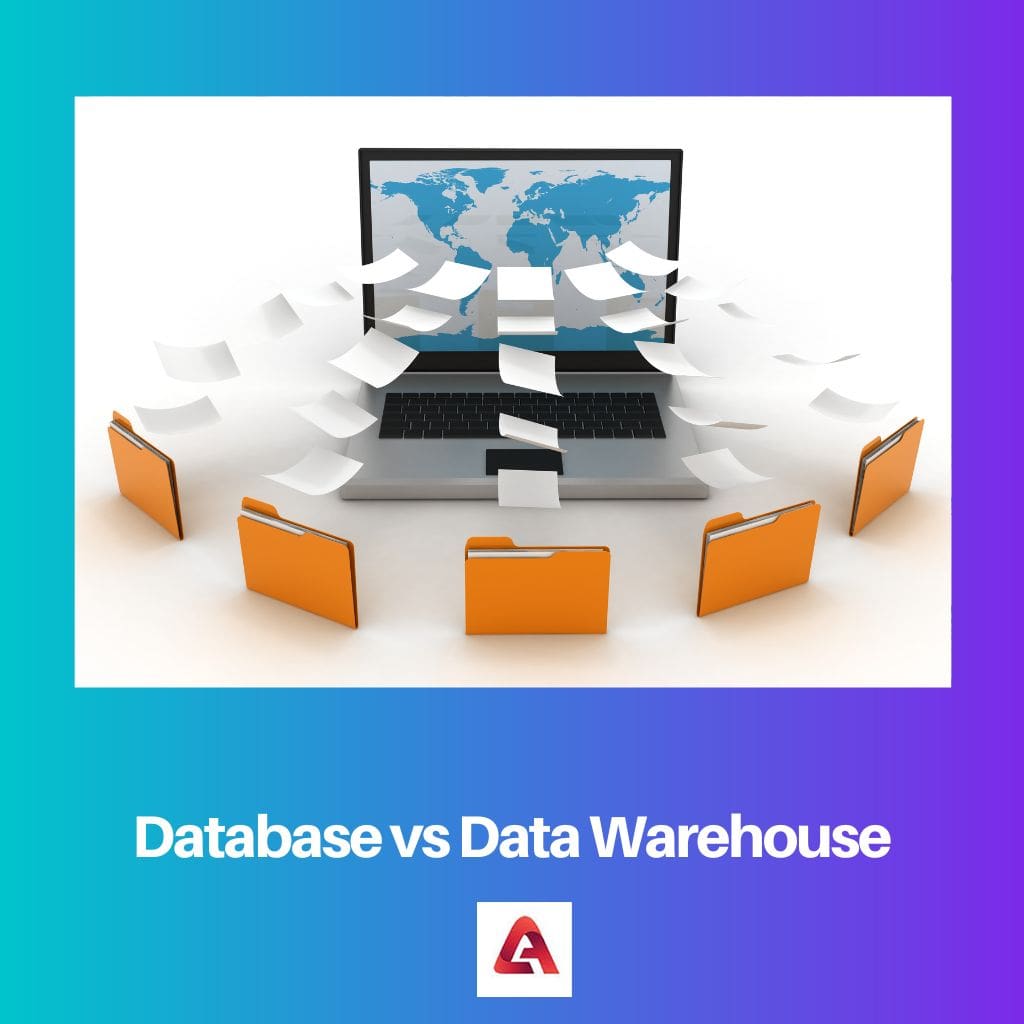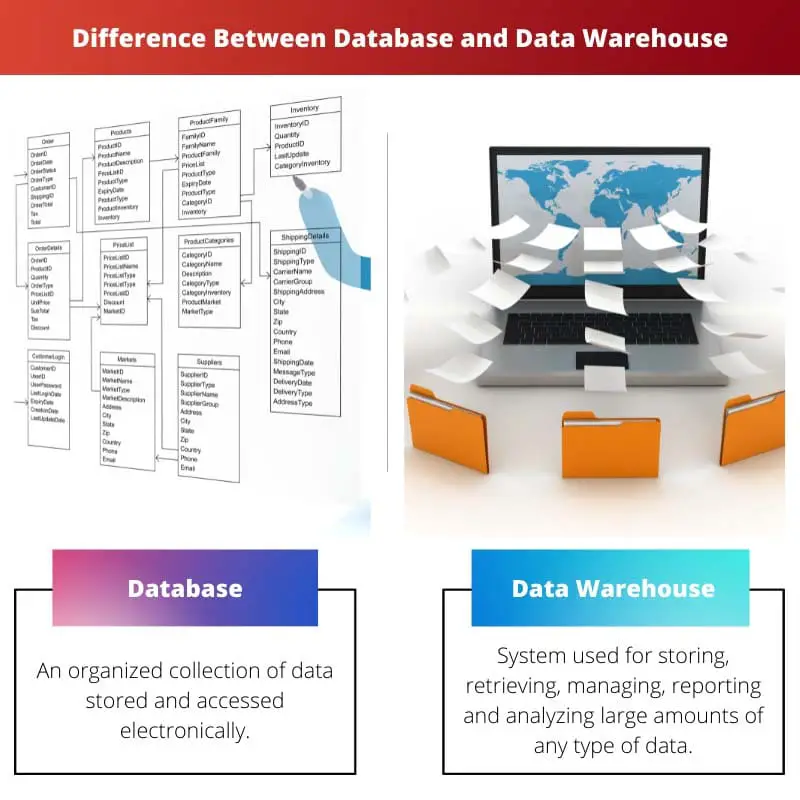A database is a structured collection of data organized for efficient retrieval, storage, and management, typically used for transactional processing. On the other hand, a data warehouse is a centralized repository that integrates data from multiple sources to support analytical reporting, querying, and decision-making processes, often optimized for complex queries and data analysis, with a focus on historical and aggregated data.
Key Takeaways
- Databases store and manage current, operational data; data warehouses consolidate historical and analytical data for decision-making.
- Databases support transactional processing (OLTP); data warehouses facilitate analytical processing (OLAP).
- Databases are optimized for quick data retrieval and updates; data warehouses are designed for efficient querying and reporting on large data sets.
Database vs Data Warehouse
The difference between Database and Data Warehouse is that Database is used to record data or information, while Data Warehouse is primarily used for data analysis.

However, the above is not the only difference. A comparison between both the terms on specific parameters can shed light on subtle aspects:
Comparison Table
| Feature | Database | Data Warehouse |
|---|---|---|
| Primary Function | Store and manage data for day-to-day operations | Analyze historical data for trends and insights |
| Data Structure | Optimized for fast retrieval and modification (CRUD – Create, Read, Update, Delete) | Optimized for complex queries and analysis (OLAP – Online Analytical Processing) |
| Data Currency | Primarily current data | Primarily historical and integrated data from various sources |
| Schema | Highly normalized to minimize redundancy | Often denormalized to improve query performance for analysis |
| Updates | Frequent updates as transactions occur | Periodic updates (batch processing) |
| Users | Operational applications, individual users | Business analysts, data scientists, executives |
| Security | Focuses on data integrity and access control for specific users | Focuses on data governance and access control for analytical purposes |
| Complexity | Simpler to design and manage | More complex to design, implement, and maintain due to data integration and transformation |
| Cost | Lower cost due to smaller size and simpler infrastructure | Higher cost due to larger storage requirements and processing power |
What is Database?
Components of a Database:
- Data: The core component of a database, encompassing the actual information stored within it. Data can be structured, semi-structured, or unstructured, depending on the specific requirements of the database system.
- Database Management System (DBMS): The software responsible for managing the database. It facilitates interactions with the database, including data insertion, retrieval, updating, and deletion. Popular DBMSs include MySQL, PostgreSQL, Oracle, SQL Server, and MongoDB, each offering various features and capabilities.
- Schema: Defines the structure and organization of the data within the database. It includes tables, fields, data types, relationships, constraints, and other specifications that govern how data is stored and accessed.
- Queries: Commands used to retrieve, manipulate, and manage data within the database. Queries are written in a specific query language supported by the DBMS, such as SQL (Structured Query Language), which is widely used for relational databases.
Types of Databases:
- Relational Databases: Organize data into tables with rows and columns, establishing relationships between different entities. They adhere to the principles of ACID (Atomicity, Consistency, Isolation, Durability) to ensure data integrity and reliability. Examples include MySQL, PostgreSQL, SQL Server, and Oracle Database.
- NoSQL Databases: Designed to handle large volumes of unstructured or semi-structured data with flexibility and scalability. They depart from the rigid structure of relational databases and offer various data models, such as document-oriented, key-value, columnar, and graph databases. Examples include MongoDB, Cassandra, Couchbase, and Redis.
- NewSQL Databases: Aim to combine the benefits of traditional relational databases with the scalability and flexibility of NoSQL solutions. They provide distributed architectures and improved performance while maintaining ACID compliance. NewSQL databases target scenarios requiring high scalability and transactional integrity, such as e-commerce and financial applications.
Uses of Databases:
- Transactional Processing: Handling day-to-day operations of businesses, such as online transactions, inventory management, and customer relationship management (CRM).
- Analytical Processing: Performing complex queries, data analysis, and generating reports to support decision-making processes. Data warehouses and analytical databases are specifically designed for this purpose, aggregating and processing data from multiple sources for business intelligence and data analytics.
- Content Management: Storing and managing digital content, such as documents, images, videos, and web pages, in content management systems (CMS) and document-oriented databases.

What is Data Warehouse?
Components of a Data Warehouse:
- Extract, Transform, Load (ETL) Process: The ETL process is responsible for extracting data from various source systems, transforming it into a consistent format, and loading it into the data warehouse. This process involves cleaning, aggregating, and restructuring data to ensure consistency and quality.
- Data Storage: Data warehouses store structured, historical data in a format optimized for analytical querying and reporting. They typically employ a dimensional model, consisting of fact tables and dimension tables, to organize data in a way that facilitates multidimensional analysis.
- Metadata Repository: Metadata, or data about the data, plays a crucial role in data warehouses. It includes information about the source systems, data transformations, data definitions, and relationships between different data elements. A metadata repository centralizes this information, providing valuable context for understanding and interpreting the data stored in the warehouse.
- OLAP (Online Analytical Processing) Engine: OLAP engines enable users to perform complex multidimensional analysis of data stored in the warehouse. They support operations such as slicing, dicing, drilling down, and rolling up data to explore trends, patterns, and relationships across different dimensions.
Types of Data Warehouses:
- Enterprise Data Warehouse (EDW): An EDW serves as a comprehensive repository for integrated data from across an entire organization. It consolidates data from various operational systems and departments, providing a unified view of the organization’s data for strategic decision-making.
- Data Mart: A data mart is a subset of an enterprise data warehouse, focusing on a specific business function, department, or user group. Data marts are designed to meet the unique reporting and analysis needs of their target audience, providing a more tailored and streamlined approach to data access and analysis.
- Operational Data Store (ODS): An ODS is a database that integrates data from multiple operational systems in near real-time. While not strictly a data warehouse, an ODS serves as a staging area for operational data before it is further processed and loaded into the data warehouse for analytical purposes.
Uses of Data Warehouses:
- Business Intelligence (BI): Data warehouses are critical components of business intelligence initiatives, providing a foundation for reporting, dashboards, and ad-hoc analysis. By consolidating data from disparate sources, data warehouses enable organizations to gain insights into their business operations, performance, and trends.
- Decision Support: Data warehouses support decision-making processes by providing timely, accurate, and relevant information to business users and decision-makers. By analyzing historical and current data, organizations can identify patterns, trends, and outliers to inform strategic decisions and drive business success.
- Predictive Analytics: Data warehouses serve as valuable resources for predictive analytics, enabling organizations to forecast future trends, behaviors, and outcomes based on historical data. By leveraging advanced analytics techniques and machine learning algorithms, organizations can uncover hidden insights and make data-driven predictions to guide their business strategies.

Main Differences Between Database and Data Warehouse
- Purpose:
- Database: Primarily used for transactional processing, focusing on storing, retrieving, and managing operational data in real-time.
- Data Warehouse: Designed for analytical processing, consolidating data from multiple sources to support reporting, querying, and decision-making processes.
- Data Structure:
- Database: Typically organizes data in a normalized format to minimize redundancy and ensure data integrity, suitable for transactional operations.
- Data Warehouse: Utilizes a denormalized or dimensional model to optimize data retrieval and analysis, facilitating complex queries and multidimensional analysis.
- Usage:
- Database: Ideal for day-to-day operations, such as online transactions, inventory management, and customer interactions.
- Data Warehouse: Used for strategic decision-making, business intelligence, and data analytics, enabling users to analyze historical data and derive insights for informed decision-making.
- Data Integration:
- Database: May contain data from a single source or application, focusing on real-time data processing within a specific operational domain.
- Data Warehouse: Integrates data from multiple sources across the organization, including operational systems, external sources, and legacy systems, providing a unified view of enterprise data for analytical purposes.
- Performance Optimization:
- Database: Optimized for transactional performance, emphasizing concurrency control, transaction management, and data consistency.
- Data Warehouse: Optimized for analytical performance, supporting complex queries, aggregations, and multidimensional analysis to facilitate decision support and business intelligence initiatives.
- Data Model:
- Database: Typically employs a relational model with normalized tables, emphasizing data consistency, integrity, and referential integrity.
- Data Warehouse: Utilizes a dimensional model with fact tables and dimension tables, focusing on organizing data for efficient querying and analysis across various dimensions and metrics.

The comparison table provides a clear and concise breakdown of the differences between databases and data warehouses.
I think so too. The table simplifies the distinctions between the two.
The part about the cons of using a database is very insightful. It highlights the potential downside of relying solely on a database for decision making.
Yes, the cons are overlooked.
I think it’s important to be aware of the limitations of databases.
I didn’t find the information in this article to be particularly useful. It seemed to lack depth.
The article gives a comprehensive explanation of the main differences between database and data warehouse.
I agree, it covers all the essential aspects.
It’s an informative piece for anyone interested in databases and data warehousing.
Excellent article. The difference between databases and data warehouses is explained very clearly. It is very informative and helpful
Yes, I agree with you. Everything is well explained.
The article can be seen as an introductory guide to databases and data warehouses. It would benefit those new to the field.
I share the same view, it’s very beginner-friendly.
I do not fully agree with the comparison table in the article. It seems to be overstating the differences between databases and data warehouses.
I can see what you mean, but I think the differences are crucial.
I agree with Parker. The table seems to exaggerate the contrasts.
The article offers a balanced perspective on databases and data warehouses, emphasizing the advantages and disadvantages of each.
I agree, it presents a fair analysis of both systems.
This article presents the information in an organized manner and is written in simple language that is easy to understand.
Yes, I found it easy to follow as well.
The explanation of data warehouses is very comprehensive and guides the understanding of their complexities.
Absolutely, it unravels the intricacies of data warehousing.
I think the article does a great job of demystifying data warehousing.